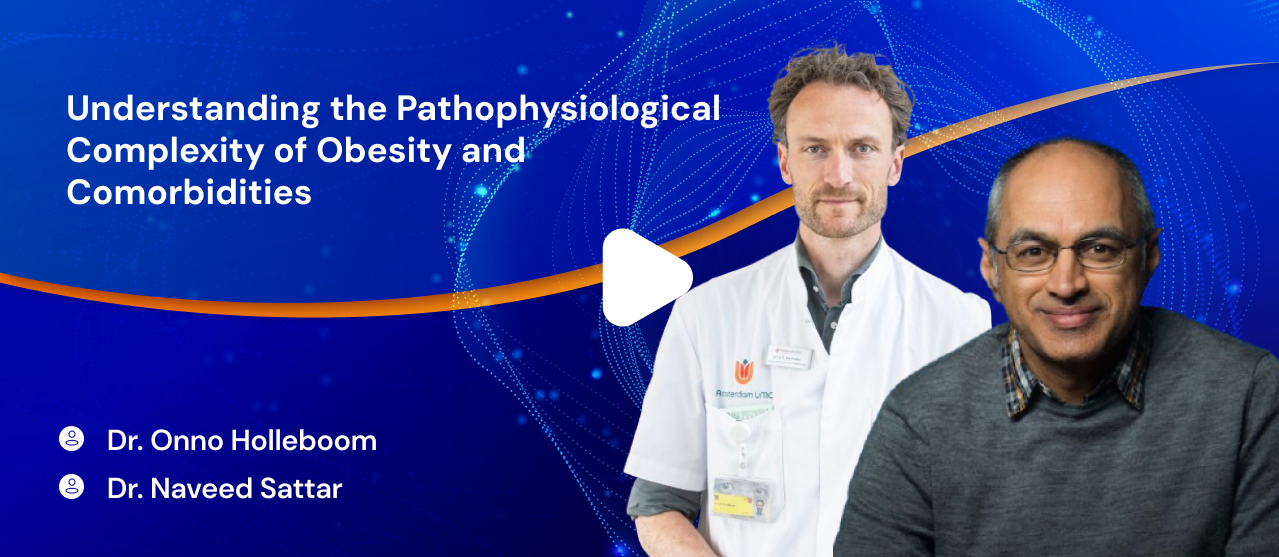Management of people living with obesity and comorbidities
From shared pathophysiology to shared management
e-Space Obesity online educational program is developed to educate clinicians managing patients with obesity and to increase the awareness of the multidimensional nature and complexity of the disease, including the interconnectivity between obesity and cardio-renal-metabolic complications, such as Metabolic Dysfunction-Associated Fatty Liver Disease (MAFLD)/Metabolic Dysfunction-Associated Steatohepatitis (MASH), Cardiovascular Disease (CVD) and Chronic Kidney Disease (CKD).
After completing this program, clinicians will be better aware of best practices and recent guidelines on the management of obesity and their patient centric approach.
- Incorporate treatment strategies based on a better understanding of the pathophysiological complexity of obesity and the interplay between overweight/obesity and the cardio-renal-metabolic syndrome, in patients with comorbidities that include MASLD/MASH, CVD and CKD.
- Assess the underlying factors contributing to obesity and the multidimensional impact of obesity on people when developing management plans for these patients.
- Apply a holistic, patient-centered and team-based approach in weight management, incorporating the latest insights into doctor-patient communication and “people-first” language
Understanding the Pathophysiological Complexity of Obesity and Comorbidities
This module will explore the definition, classification, and pathophysiology of obesity, and will provide a comprehensive overview of its
far-reaching health consequences and the need for a systematic, multidisciplinary approach to its management.
Learning Objectives
- LO 1 Explain the pathophysiology and the metabolic pathways of obesity.
- LO 2 Illustrate how obesity impacts the cardiorenal metabolic syndrome.
- LO 3 Apply the different treatment strategies for obesity.
Faculty

Dr. Onno Holleboom
Dr. A.G. (Onno) Holleboom MD PhD is an associate professor and internist in Vascular Medicine and Endocrinology at Amsterdam UMC, The Netherlands. He heads a multidisciplinary outpatient clinic for MASLD together with hepatology.

Dr. Naveed Sattar
Assessing underlying factors and multidimensional impact of obesity
This module explores the genetic, environmental, behavioral, and psychosocial factors contributing to obesity. It emphasizes individualized assessment, tools for evaluation, and evidence-based management strategies to address obesity’s multidimensional impacts and improve patient outcomes.
Learning Objectives
- LO 1 Evaluate the physiological, psychological, and environmental contributors to obesity using a comprehensive patient assessment.
- LO 2 Analyze the physical, psychological, social, and economic consequences of obesity on individuals and healthcare systems.
- LO 3 Design and implement personalized, multidisciplinary management plans for obese patients with severe comorbidities.
Faculty

Dr. Amalia Gastaldelli

Dr. Marc-André Cornier
Dr. Cornier is a Professor of Medicine with Tenure, James A. Keating Endowed Chair in Diabetes, and Director of the Division of Endocrinology, Diabetes and Metabolic Diseases at the Medical University of South Carolina.
Holistic, Patient-centered, and team approach in weight management
Learning Objectives
- LO 1 Apply the principles of holistic and patient-centered care by developing individualized care plans that address physical, emotional, social, and cultural factors impacting the patient's well-being.
- LO 2 Demonstrate effective communication skills by using people-first language to respectfully and empathetically engage with patients and colleagues, fostering a positive and inclusive healthcare environment.
- LO 3 Ability to collaborate with interdisciplinary team members to design and implement comprehensive weight management strategies that integrate medical, nutritional, behavioral, and psychosocial interventions
Faculty

Dr. Sarah Jarvis





